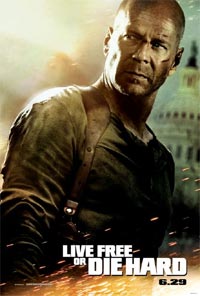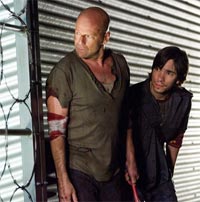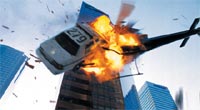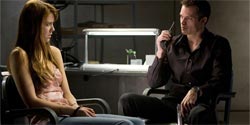System Crash: "Live Free or Die Hard"
 |
Live Free or Die Hard (2007, Dir. Len Wiseman)
"You're a Timex watch in a digital world."
"Yippie-kay-yay, mother--" [gunshot]
The two quotations above spell out Live Free or Die Hard's intent, its raison d'etre. On the one hand, it aims to be a canny update of the original Die Hard concept (with its glorification of the working-class, smartass hero) to a modern, more genteel era of mass terrorism and technogeeks. And on a more commerce-oriented level, it's a PG-13 film, all the better to draw in the wholesome kiddies who deserve carnage without the F-bombs (or as renegade film critic Vern would put it, "Live Free or Die -- Well, Let's Not Die Too Hard, There Are Children Present").
Nearly two decades ago, the original Die Hard was an apotheosis for the action genre -- acknowledging the gleeful, cartoon-like zest of Schwarzenegger and Stallone flicks, and applying the template to a protagonist a little more in line with what a normal American schmo would be like (the balding, wisecracking, almost doughy Bruce Willis), the film was a perfect capper to the Reagan years. As our beleaguered, anything-but-heroic hero John McClane contended with inept or venal institutions (the police, the government, the media) against heavily-accented Eurotrash baddies (led by the irreplaceable Alan Rickman), it was clear that what was at stake wasn't a safe full of cash in a high-tech Japanese corporate building, or even McClane's relationship with his estranged wife (who happily takes back his family name by movie's end), but the respectability of maverick American man-child heroes everywhere. It wasn't enough that Bruce saved the day and struck a blow for men in wife-beater undershirts and bare feet -- he also had to pick glass out of his feet while sobbing that he loved his wife. That curious mix of self-pity (for what is the flip side of being a macho, macho man but claiming to be misunderstood?) and self-deprecating mayhem, along with John McTiernan's take-no-prisoners direction, makes Die Hard a monument to '80s excess, and all the more classic because of it.
 |
Nearly twenty years down the road, you won't find a mainstream Hollywood actioner that can afford to be so vicious, so blatant in its stereotyping, so vibrant in its fascism -- and thus we get a PG-13 Die Hard flick. Setting aside the ludicrous concept of a Die Hard movie that isn't quite so, um, hard, the latest edition of the John McClane story is a reasonable facsimile of the Die Hard template, at least initially. This time the villainy is on a national scale as baddie Thomas Gabriel (Timothy Olyphant) and his lovely kung-fu assistant Mai (Maggie Q) paralyze computer networks across the country as part of a convoluted scheme that ultimately leads to -- you guessed it -- a gigantic robbery. In their way is McClane, who gets pulled into the affair when he's called in to apprehend computer hacker genius Matt Farrell (Justin Long of the hipper-than-thou Apple commercials), and soon finds himself in his standard poses: holding off nasty henchmen with automatic weapons, trading barbs with his archenemy over the phone, getting pounded into a bloody mess, and generally persevering through guts, sewer-rat tactics, and plain luck.
Director Len Wiseman, best known for the Matrix aesthetics of his Underworld films, approaches this film and its star almost reverently -- despite the gunmetal color palette, the hand-held cameras are steadier, the editing less flashy -- and the initial 45 minutes are deftly paced, as the crisis escalates to a fever pitch. The first act climaxes with one of those classic McClane self-rants as Willis takes himself to task for the madness he is about to unleash, and then does the only sensible thing: driving a police car right into the grille of an attacking helicopter.
 |
Live Free or Die Hard is set to soar at this stage; sadly, it backtracks into noisier, less effective stunts, less wiseacre badinage, and lots of flipping back and forth between locations (in the span of two days, Willis and Long run back and forth across five states). Die Hard functions best when McClane is like a trapped animal, having to fight off evildoers within confined spaces, but here he is a superman who comes and goes as he pleases, flying helicopters (this from the man who hated air travel in the first film), dispatching opponents with Schwarzenegger-like efficiency, and maintaining a cool-cucumber countenance throughout. At times flashes of the old, obnoxious, this-ain't-easy McClane shine through in Willis' modulated performance, but there is little else to convince us that this is the same man who jumped off the roof of a building tied to a fire hose. It doesn't help that Mark Bomback's script doesn't allow him to cut loose, or have anyone to bounce off of; it's more interested in plot logistics and endless scenes of people typing feverishly at computer terminals.
You would expect McClane to butt heads with incompetent higher authorities and beat them at their overly-smug game, but we now live in an era in which authority is meant to be respected, and thus the FBI agents (led by Cliff Curtis in this film) are presented as undermanned but supercompetent -- I'm sure it's a nice tribute to the feds, but it sure ain't that fun, or interesting. You know it's a lost cause when most of the obnoxious humor comes in the form of an extended cameo by Kevin Smith, King of the Hip Blabbermouths, as a computer hacker who still lives in his mom's basement (how original).
 |
As the film proceeds, its generic plotting and tropes become more evident: of course it must get personal for McClane, as his daughter (Mary Elizabeth Winstead) falls into Gabriel's clutches (wasn't there a Steven Seagal movie about this?), and of course McClane becomes mismatched buddies with the computer geek he's protecting (to his credit, Long manages to do something with his character despite the hoary conceit). You would hope that the bad guys would give Die Hard a shot in the arm, and Maggie Q does a good job slinking around in black combat fatigues and kicking our hero's ass for a bit ("Enough of this kung-fu shit," he says wearily at one point). Olyphant, however, is a total loss, peevish when he should be silky, dyspeptic when he should be glowering. The climax, which involves a fighter jet, some highway overpasses, and a 18-wheeler, is as artificial (boo, CGI!) and bloated as it can get, and a far cry from the DIY heroics of McClane's salad days.
By the time it ends, with the old war horse McClane nursing his fresh wounds and getting carted off to the hospital one more time, one must ask the question: Is a Timex watch needed in a digital world? The answer is a resounding yes -- but not in a film as formula-bound as this one, in which the thrills are as impersonal and mechanical as the computer-controlled ride at your local amusement park.


2 Comments:
As usual, this is excellent cinematic reporting!
A very far fetched story, as are most of the Die Hards but just way over top. It was for the most part entertaining with nonstop action but the plot was weak and the acting dismal.
Post a Comment
<< Home